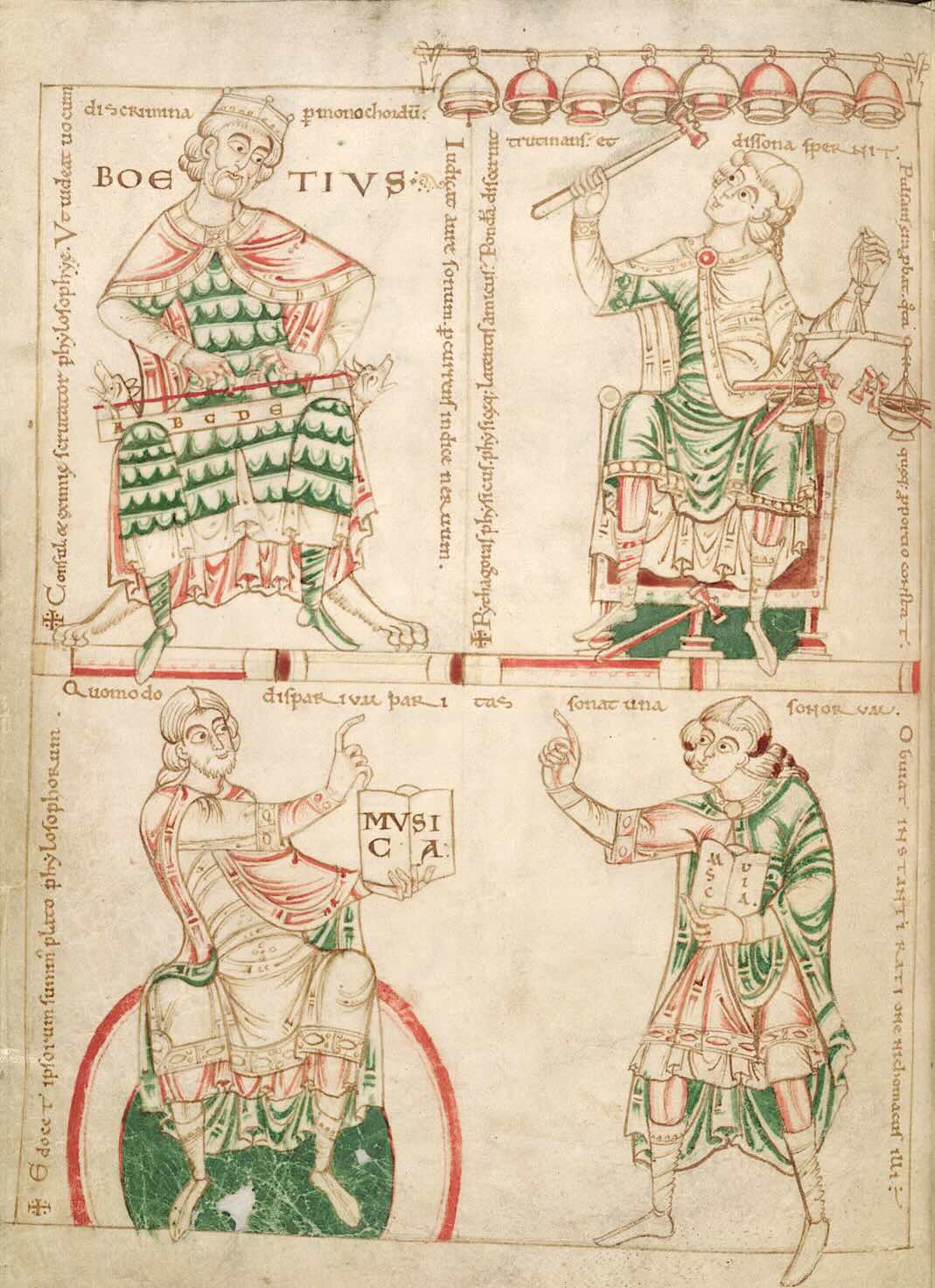波伊提烏 (Anicius Manlius Severinus Boethius約480—524/526)
波伊提烏是中世紀最受尊敬和最有影響的研究音樂的權威。他的《音樂的原理》寫於6世紀初(那時波伊提烏還是一個年輕人),是按照四藝的系統寫作的一套音樂概要。其中也有論及幾何、數學和天文學的類似內容,為學生們學習哲學打基礎。在音樂論文中,波伊提烏很少有原創的東西,他只是在現成的希臘資料基礎上進行編纂,主要是現在已經無存的尼科馬庫斯Nicomachus的一篇冗長的論文,以及托勒密Ptolemy的《音樂論》的第一卷。雖然中世紀的讀者可能沒有認識到波伊提烏在多大程度上依賴其他作者,但他們理解他的論述是根據希臘的數學和音樂理論的。他們對《音樂的原理》中矛盾百出也不感到煩惱,書中前三大部分是畢達哥拉斯Pythagorean的觀點,第四卷有些部分則來自歐幾里德Euclid和亞里斯多塞諾斯Aristoxenus,而第五卷則根據托勒密的著作,部分是反畢達哥拉斯的。大多數讀者從書中得到的信息是,音樂是一種數的科學,數的比率決定旋律的音程、協和音、音階的構成,以及樂器的調音和人聲。
這本書最具創新精神的部分是,波伊提烏在開頭幾章中把音樂分成三類。
第一類是“宇宙的音樂”,在星球運動、四季變化和四大要素中看到的有序的數字關係。
第二類是“人類的音樂”,控制身體和靈魂及其各部件的和諧。
第三類是“樂器的音樂”,由樂器包括人聲所產生的可以聽到的音樂,它們證明瞭秩序的同一原則,特別是在音程的數字比率方面。
波伊提烏強調音樂對人的性格和道德的影響。因此,音樂在對青年的教育中居於重要的地位,這既是它本身的要求,也是進一步學習哲學的門徑。波伊提烏成為意大利統治者蒂奧多Theodoric的領事和大臣,後來他寫了一篇詩歌形式的哲學論文《哲學的慰藉》,那時他作為一個政治陰謀的犧牲者被關在監獄里。
把“樂器的音樂”(我們現在理解的音樂藝術)放在第三類,想必是最低的一類,波伊提烏表明,他和他的老師們都把音樂視為知識的一個客體。他寫道,音樂是利用理性和感性去考察各種高低不同聲音的學科。因此,真正的音樂家並不是歌唱家,或者並不理解這一媒介的性質,而只憑天性寫作歌曲的某些人。只有哲學家、評論家才是真正的音樂家,他們“表現出能夠按照推測或適於音樂的理性去形成判斷的天賦”。
【文本來源:Donald Jay Grout_ Claude Victor Palisca- 西方音乐史-人民音乐出版社(2010)(第六版) 第25頁】
Boethius
Anicius Manlius Severinus Boethius (ca. 480-524/26) was the most revered and influential authority on music in the Middle Ages. His De institutione musica (The Fundamentals of Music), written in the first years of the sixth century when Boethius was a young man, is a compendium of music within the scheme of the quadrivium. Together with similar texts on geometry, arithmetic, and astronomy, it prepared students for further studies in philosophy. There is little that is original in the music treatise: Boethius compiled it from Greek sources that he had at hand, mainly a lengthy treatise by Nicomachus that has not survived, and the first book of Ptolemy's Harmonics. Although medieval readers may not have realized how much Boethius depended on other authors, they understood that his statements rested on Greek mathematics and music theory. They were not bothered by the contradictions in De institutione musica, in which the first three books were heavily Pythagorean, the fourth contained elements derived from Euclid and Aristoxenus, and the fifth, based on Ptolemy, was partly anti-Pythagorean. Most readers came away with the message that music was a science of numbers and that numerical ratios determined the melodic intervals, the consonances, the composition of scales, and the tuning of instruments and voices.
In what is the most original part of the book, the opening chapters, Boethius divides music into three kinds.
The first is musica mundana (cosmic music), the orderly numerical relations seen in the movements of the planets, the changing of the seasons, and the elements.
The second is musica humana, which controls the union of the body and soul and their parts.
Last is musica instrumentalis, audible music produced by instruments, including the human voice, which exemplifies the same principles of order, especially in the numerical ratios of musical intervals.
Boethius emphasized the influence of music on character and morals. As a consequence, music occupied an important place in the education of the young, both in its own right and as an introduction to more advanced philosophical studies. Boethius, who became a consul and minister to Theodoric, ruler of Italy, later wrote a philosophical treatise in poetic form, The Consolation of Philosophy, while imprisoned as a victim of political intrigue.
In placing musica instrumentalis — the art of music as we understand it now - in the third and presumably lowest category, Boethius showed that he and his mentors saw music as an object of knowledge. Music, he wrote, is the discipline of examining the diversity of high and low sounds by means of reason and the senses. Therefore, the true musician is not the singer or someone who makes up songs by instinct without understanding the nature of the medium, but the philosopher, the critic, "who exhibits the faculty of forming judgments according to speculation or reason relative and appropriate to music."
[Source: Donald Jay Grout_ Claude V. Palisca - A history of western music-6th Edition - Norton (2001) - 6th Edition, pp.27-29]
